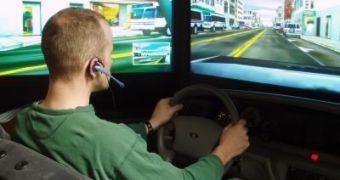University of Utah psychologists have published a study showing that motorists who talk on handheld or hands-free cellular phones are as impaired as drunken drivers.
"We found that people are as impaired when they drive and talk on a cell phone as they are when they drive intoxicated at the legal blood-alcohol limit" of 0.08 percent, which is the minimum level that defines illegal drunken driving in most U.S. states, says study co-author Frank Drews, an assistant professor of psychology. "If legislators really want to address driver distraction, then they should consider outlawing cell phone use while driving."
Psychology Professor David Strayer, the study's lead author, adds: "Just like you put yourself and other people at risk when you drive drunk, you put yourself and others at risk when you use a cell phone and drive. The level of impairment is very similar."
Each of the study's 40 participants "drove" a PatrolSim driving simulator four times: once each while undistracted, using a handheld cell phone, using a hands-free cell phone and while intoxicated to the 0.08 percent blood-alcohol level after drinking vodka and orange juice. Participants followed a simulated pace car that braked intermittently.
Both handheld and hands-free cell phones impaired driving, with no significant difference in the degree of impairment. That "calls into question driving regulations that prohibited handheld cell phones and permit hands-free cell phones," the researchers write.
The study found that compared with undistracted drivers:
- Motorists who talked on either handheld or hands-free cell phones drove slightly slower, were 9 percent slower to hit the brakes, displayed 24 percent more variation in following distance as their attention switched between driving and conversing, were 19 percent slower to resume normal speed after braking and were more likely to crash. Three study participants rear-ended the pace car. All were talking on cell phones. None were drunk.
- Drivers drunk at the 0.08 percent blood-alcohol level drove a bit more slowly than both undistracted drivers and drivers using cell phones, yet more aggressively. They followed the pace car more closely, were twice as likely to brake only four seconds before a collision would have occurred, and hit their brakes with 23 percent more force. "Neither accident rates, nor reaction times to vehicles braking in front of the participant, nor recovery of lost speed following braking differed significantly" from undistracted drivers, the researchers write.
"Impairments associated with using a cell phone while driving can be as profound as those associated with driving while drunk," they conclude.
"This study does not mean people should start driving drunk," says Drews. "It means that driving while talking on a cell phone is as bad as or maybe worse than driving drunk, which is completely unacceptable and cannot be tolerated by society."
Cell phone use is far from the only distraction for motorists. The researchers cite talking to passengers, eating, drinking, lighting cigarettes, applying makeup and listening to the radio as the "old standards" of driver distraction.
"However, over the last decade many new electronic devices have been developed, and they are making their way into the vehicle," the researchers write. "Drivers can now surf the Internet, send and receive e-mail or faxes, communicate via a cellular device and even watch television. There is good reason to believe that some of these new multitasking activities may be substantially more distracting than the old standards because they are more cognitively engaging and because they are performed over longer periods of time."
Photo Credit: Jim Moulin, University of Utah

 14 DAY TRIAL //
14 DAY TRIAL //